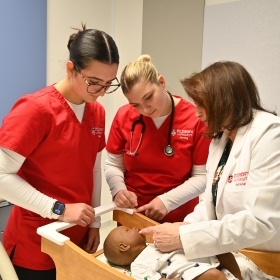How to Adjust to College: Quick Tips for a Great First Year

Learn practical tips from experts at St. John's University, Queens, NY, on adjusting to college, making friends, managing coursework, and handling stress effectively.
Transitioning to college is a significant change, and it’s perfectly normal to feel a bit overwhelmed. You’re in a new place, meeting tons of new people, and figuring out how to handle everything from roommates and managing course loads to enjoying newfound freedom. It’s exciting—but can also be a little intimidating. The good news? Everyone’s in the same boat.
To help you adjust to college life, here are essential tips to guide you through the ups and downs of your first year. Whether you’re worried about finding your place socially or balancing your academic responsibilities, you will learn how to make the most of your college experience.
Making Friends in College
Making friends in college can seem daunting at first, but remember—most students are just as eager to meet new people as you are. While it might feel awkward to strike up conversations with strangers, taking small, genuine steps toward building connections can make all the difference. Whether it’s introducing yourself to someone in your dorm, sitting next to someone in class, or joining a club, you’ll find plenty of opportunities to meet like-minded people.
One of the best ways to adjust to college and make friends is to get involved in campus activities. At St. John’s University, programs like the R.I.S.E. Network provide personalized support and opportunities for mentorship. This network connects students with peers and mentors who can help ease the transition.
Participate in events like the Red Storm Welcome and engage in activities organized by the campus. Events such as Stormin’ Loud or DAC After Dark offer chances to socialize and find your community. Clubs and organizations on campus, including those related to your interests, can also be great places to meet new people. St. John’s has more than 180 clubs and organizations ranging from cooking, to Disney, to cultural societies, academic and career-oriented groups, and more. Attend events, go to social gatherings, and don’t be afraid to say ‘yes’ when opportunities arise. Building friendships takes time, so be patient, but putting yourself out there early can help ease the transition into college life.
Pro Tip:
Keep an open mind when meeting new people. Your college friendships may come from unexpected places, so don’t limit yourself to just one group. Being approachable and showing interest in others is a great way to build lasting relationships.
Dealing with Roommates in College
Living with roommates in college is often one of the biggest adjustments for first-year students. You may have never had to share your personal space before, and learning how to coexist with someone new can be a challenge. Whether your dorm roommate is a friend or a stranger, the key to getting along with roommates in college is establishing open communication early. Talk about your preferences when it comes to things like cleanliness, noise levels, and schedules. Setting boundaries with your college roommate from the beginning can help prevent future conflicts.
When living with roommates in college, compromise is crucial. It’s important to be respectful of each other’s needs. If you’re having an issue—like your roommate playing music while you’re trying to study—bring it up in a calm, nonconfrontational way. Don’t let small frustrations build up until they become bigger problems. If you and your roommate can’t resolve issues on your own, don’t hesitate to seek help from your Resident Assistant (RA), who’s trained to help mediate conflicts.
Coping with Loneliness and Homesickness
Feeling lonely or homesick is a common experience for many first-year students. Being away from home and your familiar support system can be challenging, but there are ways to cope with these feelings.
Stay connected with loved ones through regular calls or video chats. Even a quick check-in with family or friends can help bridge the gap between home and college until Family Weekend. Remember, it’s important to try and push through though. Statistics show students who continue to experience homesickness are less likely to return to school the following year. By continuing to put yourself out there, trying new things, and pursuing your own passions, you’ll find a group and sense of belonging in no time.
Pro Tip:
If feelings of loneliness or homesickness become overwhelming, don’t hesitate to reach out to campus counseling services or a mental health professional. They can provide support and strategies to help you manage these emotions effectively.
Adjusting to the College Workload
The academic demands of college can feel like a big jump from high school. With heavy course loads, more in-depth assignments, and less structured guidance, it’s easy to feel overwhelmed at first. The key to managing your college workload stress and adjusting to the college environment is to stay organized and develop strong time-management skills. Unlike high school, where teachers often remind you of deadlines and assignments, in college, the responsibility of your heavy course load is largely on you to keep track of everything.
Start by breaking large assignments into smaller, more manageable tasks. Rather than waiting until the last minute to cram for exams or finish projects, set deadlines for yourself and tackle a little bit each day. Using a planner or an app to track your assignments, exams, and social commitments can help you avoid the last-minute scramble. If you find yourself struggling with the heavy course load and material, take advantage of resources like the St. John’s University Tutoring Center, which offers academic support and assistance with coursework. Additionally, attending office hours with your professors or participating in study groups can be beneficial.
Managing Stress in College
Stress is a normal part of college life, especially during your first year when everything is new. In fact, nearly half of all college students experience higher than average stress levels. From dealing with coursework to navigating social dynamics, it’s easy to feel overwhelmed. However, learning to manage stress in college early on can help you stay healthy, focused, and productive. One of the most effective ways to adjust to college and reduce stress is to establish a self-care routine. At St. John’s University, you can utilize campus resources like the fitness trails or intramural programs for regular exercise and the Center for Counseling and Consultation for mental health support.
It’s also important to pay attention to both your physical and mental health. Getting enough sleep, eating well, and staying active can go a long way in helping you manage stress. And when things start to feel too overwhelming, don’t hesitate to ask for help. Many campuses, including St. John’s, offer counseling services, mental health resources, and wellness programs to support students through difficult times. Talking to a friend, adviser, or counselor can provide you with the support you need to manage your stress.
Related: Read our blog post on "How to Avoid Burnout in Your First Year of College."
Pro Tip:
Practice mindfulness or meditation to help calm your mind during stressful times. Even just five minutes of deep breathing exercises can help you refocus and lower anxiety levels.
Tips for First-Year College Students
College can feel like a whirlwind, especially in your first year. But with a few tried-and-true survival strategies, you can set yourself up for success and make the most of your experience. These quick tips will help you tackle the challenges of college life with confidence:
Attend your classes regularly: Without the requirement of attending class everyday, skipping your college courses might seem tempting. But staying engaged will help you stay on top of your coursework and build strong academic habits.
Use campus resources: Take advantage of the St. John’s University Learning Commons, Career Services, and Wellness Programs. They’re there to support your academic and personal success.
Stay organized: Use a planner or app to track assignments, exams, and social events so you don’t get overwhelmed. This will also help you establish a routine to keep yourself focused.
Connect with your professors: Visit them during office hours, ask questions, and show interest in the course material. Building these relationships can lead to opportunities like internships, research positions, and strong letters of recommendation in the future.
Balance academics and social life: Prioritize your workload, but make time for self-care and social activities to keep a healthy balance.
Ask for help: Whether it's a friend, an adviser, or a counselor, reaching out when things get tough is a sign of strength.
Finding Your Way
Abraham Maslow, the psychologist who created the hierarchy of needs, said, “In any given moment, we have two options: to step forward into growth or step back into safety.” Your first year of college is just that—a time of growth, learning, and self-discovery—if you allow it to be.
While there will undoubtedly be challenges, with the right strategies in place, you can confidently navigate this transition. Whether you’re focused on making new friends, managing your coursework, or handling stress, remember you’re not alone.
Learning how to adjust to college life is a process that takes time, but with patience and perseverance, you’ll find your rhythm. College is about more than just academics—it’s about finding your place, building relationships, and growing into a more independent, resilient version of yourself. Embrace the journey, take things one step at a time, and don’t be afraid to ask for help when you need it.
Ready to begin your college journey?
Learn more about the supportive community and academic opportunities at St. John's University, or take the next step by applying today. Start shaping your future at a place where you’ll grow, thrive, and succeed.







